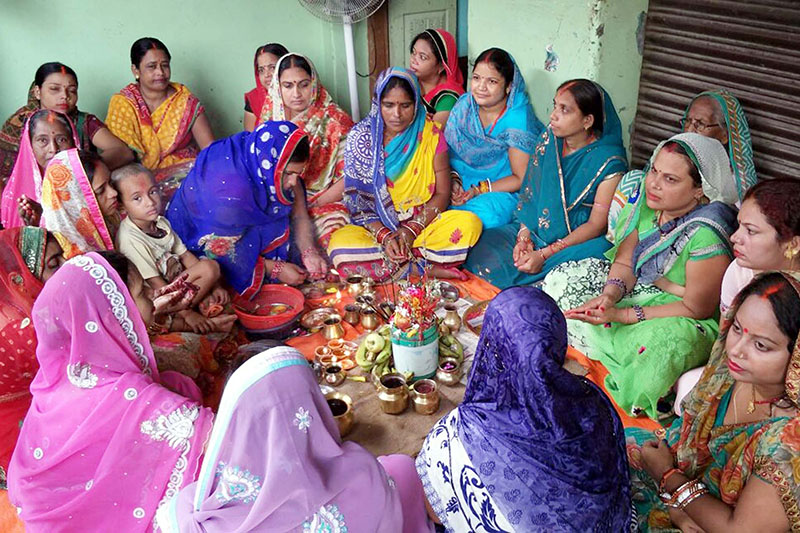Tharu community observes Jitiya festivities amid COVID-19 pandemic
KATHMANDU: Jitiya, one of the major festivals celebrated by married women of Tharu community, commenced with the observance of the Naha Kha ritual on Wednesday, in Mithila region. Naha Kha means to take food after taking the ritualistic bath.
Apart from the Tharus, women from other communities living in harmony with the Tharu community also celebrate the festival with fervour. Devotees and revellers are observing 'Upaas' or 'Upabas' on the second day of the festival today.
This year, the Jitiya festivities have been low-key as people are observing the festival at their homes due to the restrictions imposed by the authorities to curb the spread of the coronavirus pandemic. The government has restricted gatherings in open spaces for any purposes including religious places to curb the spread of novel coronavirus in the country.
Generally, Jitiya festival falls on the seventh, eighth and ninth day of the waning moon (Krishna Pakshya) in the month of Ashwin, tentatively nine or 10 days before Ghatasthapana (Ashwin Shukla Pratipada).
Usually, women are invited to their parents’ homes to observe the fasting ritual. Those who do not have brothers or sisters invite their cousins. The festival is celebrated by children and adults with fervour at their maternal homes.
Married women who do not get to visit their parental home also celebrate this festival at home. There is a tradition that the women are brought to their parental home a day or two before the festival begins. The celebrating women take food items including squab meat, mutton, chicken and fish that they prepare in advance.
On the first day of the festival, women observing the fast partake of special food comprising beaten rice, curd and ‘amot’ (raisin of dried mango juice), after making offerings to the deity Jitamahan and the ancestors. The offering to the deity and ancestors is made from mustard cake, molasses and mustard oil. The fasting is observed from 4:00 am on the day following ‘Naha Kha’ until 8:00 am the next day.
Women observing the fast take holy dips in local rivers and ponds in the morning. The devotees and juniors listen to the story of ‘Jitamahan’ as narrated by senior members of the community. The oil offered to the deity is given to the offspring who then apply it on their heads and bodies.
There is a practice of family members eating food comprising bread (roti) made from millet flour, curry made out of ‘nuni’ greens and fish, after performing the rituals on the first day of the festival. This special food goes by the name of ‘Machh Maruwa’ in the local dialect.
Moreover, the fasting women have to observe what is called the ‘Othgan’ ritual which requires them to apply some food on their lips early in the morning before the cawing of crows.
Women performing the Othgan ritual usually take curd and beaten rice. Subsequently, their fast begins which is very tough in itself. It is performed on Ashwin Krishna Ashtami, the eighth day of the waning moon in the month of Ashwin or Asoj as per the lunar calendar, according to Pundit Kalikant Jha.
Married people observe Jitiya fast wishing for the longevity of children, to be blessed with happiness and peace in the family. The festival carries religious, cultural and tantric importance, as per the believers.
Jitiya highlights the cultural role and importance of women in Tarai region. The festival that is observed in the Pitri Paksha (special period dedicated to the ancestors) also offers pinda (ball of cooked rice or barley flour) to the departed souls.
Jitiya fast is observed as a scared ritual. There remains a strict cultural belief that if a woman observing the fast burps, coughs or mistakenly bites the tongue, her fast is believed to have been unsuccessful and she is forbidden from observing this fast forever in her life.
A myth associated with this festival is that once there was a king called Shalivahan. One day, a demon took away seven sons of a woman and it was the king who brought back her sons from the captivity of the demon. Since then, the very woman in gratitude to the king started observing the festival, renaming the king as Jitamahan.
Compiled by Suresh Chaudhary






